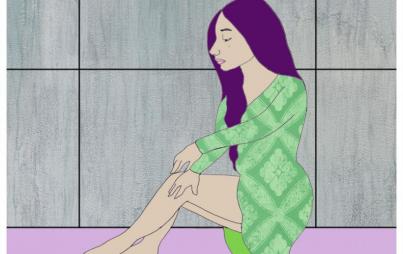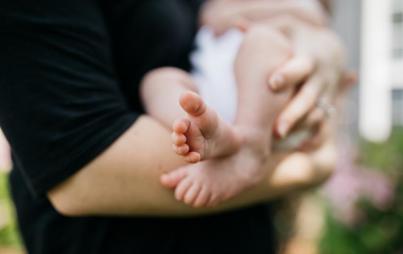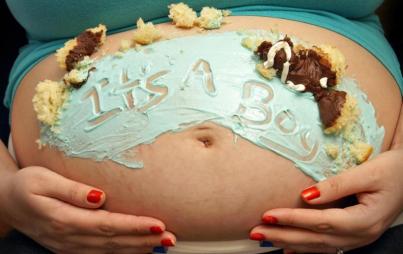
When you're supposed to be happy, but you aren't.
My depression made it especially difficult to connect with the cluster of cells growing inside me.
I never wanted kids. Growing up, I was the baby in the family, the idea of being a mother never really appealed to me.
In my early twenties, I was in a longterm relationship, and after a while, the questions began about whether we would ever get married and have kids. I rolled my eyes every single time. “That’s just not me,” I would explain. And it wasn’t.
Fast forward to my late twenties, I was traveling and partying all the time. That is, until I met someone. We had that mad, passionate sort of romance. We just couldn’t get enough of one another. So it wasn’t all that surprising that I got pregnant soon. And that’s when things took a dark turn. When I first saw the positive on the pregnancy test, I felt the weight of the world come crashing down on me. Being staunchly prochoice, I immediately considered an abortion.
My then boyfriend was supportive in whatever I chose though I could tell he was excited at the prospect of starting a family with me. And a small part of me felt that, too — the excitement to give in to what else life might have in store. We were so in love; nothing seemed too hard to handle. I decided to keep the pregnancy.
I was still enamored with my boyfriend, but I was resistant to call the fetus a baby just yet.
Things didn’t turn out to be as easy as I’d imagined. With my first trimester came not only a tremendous amount of nausea, but also a deep depression — the kind I never experienced. My mood swings kicked into high gear during my first trimester. I would feel on top of the world one moment, and fantasize about jumping off the roof of my boyfriend’s apartment building the next.
He could tell something was wrong, but never realized the extent of it. My depression made it especially difficult to connect with the cluster of cells growing inside me. When I started bleeding one day at work, I felt a mix or terror and relief, maybe my pregnancy wasn’t meant to be.
We rushed to the hospital to see what was wrong, but the ultrasound showed that the fetus was OK. “It’s called a threatened abortion. Just take it easy for a few days,” the doctor told me. Over the next few weeks, my boyfriend would become more and more enamored with our potential child. I was still enamored with my boyfriend, but I was resistant to call the fetus a baby just yet.
I could tell it bothered him, but he accepted my inability to connect with the pregnancy just yet. I read stories of women who also had trouble connecting to their pregnancies, and even to their babies, but eventually found love for them. I took comfort in these stories, doing my best to push dark thoughts aside. I had a second threatened abortion some days later, and as a result of missing work was fired from my job.
The stress began to mount as my boyfriend became sole provider for our growing family. In an attempt to bring some positivity into our lives, we decided to get married. It was a short-lived joy. My depression refused to budge. It started to become more manageable as I made my way into my second trimester, now as a married woman, but it was still there, lingering in the shadows, peeking out anytime I was alone or without a distraction.
No longer working, and feeling as though I could not re-enter the workforce in my “condition," I wound up reading about pregnancy and watching lots of daytime television, wondering in the style of David Byrne, like “How did I get here?” To add to the list of stresses, my husband decided to take a job up in Central Florida. We thought the change of pace from our South Beach apartment might help, but in retrospect, it only made things worse.
I spent most days in our apartment alone, emptying boxes and waiting for my husband to return, excitedly greeting him at the door. I felt lonelier than I ever had before. I didn’t recognize who I was anymore. I tried to play my role, but inside I was drowning. My birthday came around and with it came the revelation that I would be having a female child. I was ecstatic at the idea of having a daughter.
My obsession with Gilmore Girls had entrenched a strong desire to someday have a child who would be my best friend, with whom I could bingewatch my favorite shows and get mani-pedis with and to whom I could bestow my years of dating knowledge. Suddenly, I began to come around to my pregnancy, to finally refer to my fetus as my baby. It wouldn’t last long. Just a few weeks later, I noticed some spotting and began to panic.
My husband was at work, so I drove myself to the hospital, still finding myself between doctors. The nurse at the hospital did a stress test and checked my cervix and told me everything seemed just fine with the baby. I cried tears of relief and went home. But over the next few days, the spotting would only get worse, and by Friday, it was like a regular period.
I raced back to the emergency room, and they performed an ultrasound to see if anything seemed strange. I got to see my baby in 3D for the first time. All my fears took a back seat to the joy I finally felt in seeing her tiny, squished up face on that piece of paper. I wanted nothing more than to make sure she was safe and sound in there. The following morning, my husband and I were preparing to drive down to Miami to empty out his storage space.
Something felt off, though. I felt some strange pains I mistook for indigestion or gas. My husband wanted to know if I wanted to return to the hospital, but as they had just discharged me the day before saying all was well, I didn’t see the point. We drove down for five hours, and try as I might to ignore it, the pain I was feeling only got worse. By the time we got to Miami, I couldn’t take it anymore. “Something is wrong,” I said, suppressing my tears.
He rushed us to Mount Sinai where they gave us the bad news. “The baby is trying to come out. We’re going to do all we can to stop it,” the doctor told us, but her expression lacked any sort of real hope. They gave me a series of medications while my husband called my family. A neonatologist came in to ask if we wanted then to do all they could to save our baby should she be born soon. He explained that at 22 weeks, Her chance of survival was between 0 and 10%. “Please do whatever it takes,” we pleaded, our hearts breaking over and over again.
At around 2 a.m., I pushed my tiny, 15-ounce baby girl into the world. I saw her little arms and legs kicking around in the air as the doctor handed her over to a team of professionals who whisked her out of the room to try and save her life. I never got to see her face. The next morning, we were waiting to return to the NICU to visit our daughter, but the nurse kept delaying. Finally, at around 10 a.m., she came to give us the worst news of our lives.
Our precious child, whom we’d finally named Margaret Hope, was gone. It took me nearly five months to begin to love my child, only to have that love ripped away from me. I’ve spent the past three years loving her more in death than I ever had the chance to in life, and I know now that much of it was a direct result of my untreated depression.
Antenatal depression affects 14-23% of all pregnant persons and is a risk factor for preterm labor and pregnancy loss. Perhaps if I’d gotten the mental help I needed, I would have had a chance to know and love her longer, while she was still here. Pregnancy is hard enough, but no one should have to feel depressed as well on top of it all. Help is out there, and there’s no shame in reaching out.








